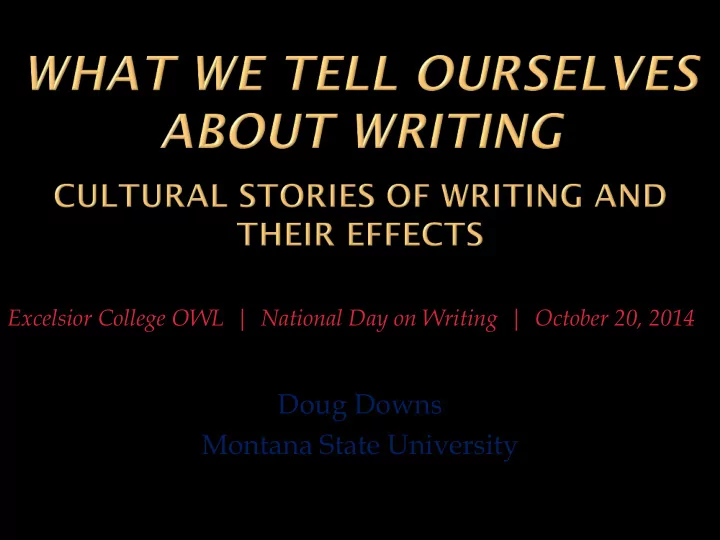

Excelsior College OWL | National Day on Writing | October 20, 2014 Doug Downs Montana State University
Showing “ that people from all walks of life, people of all ages, are writing and have an interest in writing.” – Elizabeth Claytor, Community College of Allegheny County and Chatham University, 2009.
The writing across the National Gallery would “showcase the unacknowledged, ephemeral writing that pervades ordinary life.” – Danielle Koupf, University of Pittsburgh, 2009.
Writing is the basic, fundamental skill of following straightforward, grammatical rules in a linguistic modality, creating a universal “conduit” which can clearly transmit any content unaltered from writer to reader.
Writing is a romantic art form, the mastery of which requires talent and a kind of solitary genius, and the point of which is authentic expression in complete freedom from rules, structure, and judgment.
Writing is avoiding breaking rules Rules are about format, mechanics, order, and grammar Schaeffer paragraphs and five paragraph essays
“[Complexity of] syntax or logic account for little.” “Length , error, vocabulary, and concreteness account for nearly all.” -- Richard Haswell
M echanics came to count as good writing “above all other criteria (thinking, significance, sentences, authority, voice, style, focus, and organization, just to name a few)” (63 ). Teachers associate writing problems with grammar rather than with logic at every opportunity.
Rules Students Learn: Sentences which aren’t grammatically correct aren’t useful Grab your reader’s attention immediately or don’t write Don’t use I Use five paragraphs
In this story, “writing” is following a set of grammar and formal rules that are thought to be universal and which ought to be learned to perfection in high school.
Form Content Style Ideas Format Argument Grammar “Subject” Mechanics “Writing” “You grade the writing, we’ll grade the content!”
Gaining Ground , again: The better a writer knows their subject, the more fluent their prose. Syntactic fluency regresses when subject knowledge wanes.
But this is not the story U.S. cultures usually tell.
Writing is a universal form, or container into which any content can be “poured,” and the best containers are the ones that don’t affect the content .
Conduit Metaphors “getting my ideas through” “I don’t get what you mean here” “I just need to get this idea across” Writing is a means of transmitting ideas from one place to another unaltered.
Ideas can be independent of language, rather than inevitably shaped or colored by it. Better language is more “neutral” or “precise” language, or less “loaded” language. Ideas precede writing and stand apart from it.
Writing transmits content Clear writing transmits uncontaminated content Writing is form
Writing as a universal “device” which can run any app Content and genre as apps To teach writing, according to this cultural story, is to teach writers to build the universal device.
Writers (big-W): Someone who does “ creative ” writing (or literature): imaginative, not informative, free from rules, structure, judgment, and, ultimately, other readers.
“The more factual it is, the less interesting it’s likely to be.” As will be the people who write it. Authenticity and free expression are precluded by “structure,” factuality, and judging readers.
Students are, in other words, valorizing some of the writing least responsive to the rules they’ve been taught, least responsive to reader constraints in the user-world, while being pummeled about the necessity of following rules in their own writing. “You have to know the rules before you can break them.”
This writing represents freedom from rules and structure, the ability to write without judgment , and furthermore, no responsibility to factuality or learned information .
Students writers come to associate imaginative writing with a rarefied experience that must be completely private — lyrics written in bedrooms — or completely artistic (for the lucky gifted few).
The more you believe writing demands a special gift, the more likely you are to believe that you’re a bad writer if writing isn’t easy. And the more likely you are to think writing is an act of pure self- expression.
Structure – School / Work Authenticity – Personal Rules Free of rules Formats Unstructured Mechanical Expressive Being tested Agentive Judging readers Un-judged No opinion Voiced Not being themselves Real and meaningful
“Nothing you’ve said has been right!”
Beyond school, writing is … Used more than judged Used to get things done Structured by function Rarely arbitrary The Game Changes
To woo lovers! To end wars! To prevent disease!
Writing is material-arranged Change material, change arrangement; change arrangement, change material
There isn’t any writing that doesn’t demand, and reward, creativity.
It has not escaped our notice that the specific pairing we have postulated immediately suggests a possible copying mechanism for the genetic material. -- James Watson and Francis Crick, Nature , 25 April 1953
Even “information” is story: creative retelling of data, itself creatively (interpretively) gathered and selected. “Narrative as a Human Communication Paradigm” – Walter Fisher
Like football Like ballet Like playing a musical instrument Like mountain biking Like rugby Writing is not in the category of Things That Can Be Made Perfect.
Writing is fundamentally collaborative and inevitably interactive. Writing is as much visual as verbal. Writing is inevitably technological. Writing is rhetorical — situated, motivated, contingent, interactional, and epistemic.
Happy National Day on Writing!!
Recommend
More recommend